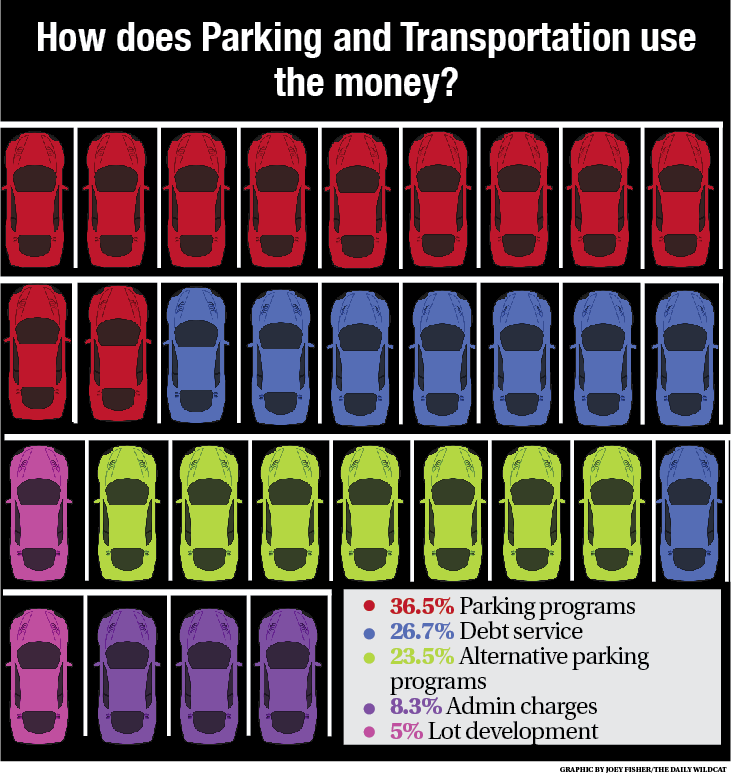About 20 percent of UA students live in dorms on campus, leaving the other 80 percent to commute to their classes every day.
This issue leads to students such as Michael Hernandez, a senior majoring in journalism and physiology, questioning the rising cost of parking.
“It’s just really, really frustrating as a commuter having to drive 30 minutes and then paying them for the privilege of being able to go to my classes,” Hernandez said.
Garage parking permit prices at the UA have increased for the third year in a row since 2012, rising to $615 for an annual pass. The garage parking permit is the most expensive out of all the parking options, and the cost of off-campus parking has stayed consistent since 2012 at about $200 per academic year.
“I know a lot of people who don’t have parking passes because of the price,” said Chelsea Canizales, a regional development junior who has a parking permit. “On top of tuition and everything, it’s a little steep.”
The increase of parking costs is due to the rising cost of living and the new Sun Link Tucson Modern Streetcar subsidies, said David Heineking, the director of UA Parking and Transportation Services.
Students worry about the legitimacy of the reasons behind the price increases.
“They don’t have the students’ best interest in mind, that’s for sure,” Hernandez said.
Hernandez does not currently have a parking permit and instead opts for an eight-hour day pass twice a week, which is a less expensive option.
Parking prices for the university lots and garages are determined by the Parking and Transportation Committee, the central administration, and the Office of Parking and Transportation Services. According to its website, the committee’s members are appointed by UA President Ann Weaver Hart and includes representatives from Student Affairs, Faculty Senate and others.
Budget
According to Parking and Transportation’s budget, the total revenue from all sources is $16.4 million.
Over half of that is spent on parking and alternative transportation programs such as the CatTran. A little over 25 percent is spent on debt service for the parking garages.
Revenue gained from selling permits for lots and garages accounts for over half of the funding for PTS, and visitor parking accounts for just over 25 percent. PTS is an auxiliary function of the university. Thus, it is not a state funding recipient. This also means most of the revenue PTS makes is put back into other PTS services.
“Our prices are set so we don’t make a profit,” Heineking said. “The money we bring in [is] spent on parking programs, transportation programs.”
Demand for parking
Demand is not equally spread between garages and lots, and certain garages are sold out long before others. Cherry Avenue Parking Garage and garages close to the middle of campus are usually the first to fill up, but parking has not been completely full for several years, Heineking said.
“The demand pretty much starts in the center of campus and moves out,” Heineking said.
Heineking added that this is not currently a critical problem, but the loss of some parking spaces due to construction on campus has sparked the planning for a new garage on the south side of Sixth Avenue.
Despite these plans, PTS is also focused on developing and maintaining alternate forms of transportation in order to stop overcrowding in the garages and promote sustainability.
Successful programs for commuting students, such as Sun Link and Zipcars, have countered the need for much more on-campus parking, Heineking said.
“The university and parking transportation supports sustainability,” he said. “The students want us to be sustainable; it’s become a goal of many students, and we’ve heard how important it is.”
Ben Champion, the director of the UA Office of Sustainability, has similar views on the future of on-campus parking.
“This campus continues to grow,” he said, “and we don’t have infinite space to increase our parking.”
This is one of the reasons why alternative transportation is strongly supported by PTS.
“This campus has some of the best examples of sustainability initiatives in parking and transportation I’ve seen around the country,” Champion said.
Impact on students
Overall, students who commute have a negative opinion of the parking prices on campus.
Hernandez has planned his schedule for this semester around parking, squeezing all of his classes onto Tuesdays and Thursdays so that he can avoid the high prices after being unable to receive a permit for Tyndall Avenue Parking Garage or Main Gate Parking Garage.
“I’m trying to pay the least amount possible,” Hernandez said.
Others have had milder reactions.
“I know that prices are a lot when you think about dropping $600 on a parking pass,” Canizales said, “but I’d say they’re kind of fair.”
Billma Peter, a care, health and society junior, works at the Office of Transportation and Parking Services in customer relations. She deals with complaints about parking, takes phone calls and sells parking permits.
Peter said she gets a lot of complaints from students, ranging from pricing woes to worries of certain garages’ availability.
“I think it’s really expensive,” she said. “But, I mean, there’s nothing you can really do about it.”
Parking prices increasing with the cost of living may benefit PTS, but as Hernandez pointed out, “increasing prices doesn’t help my cost of living at all; that’s the bottom line.”
_______________
Follow Annie Dickman on Twitter.









